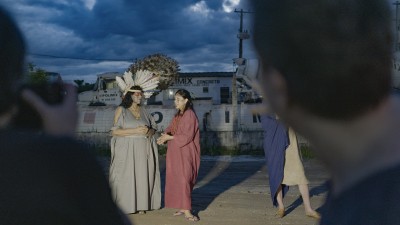
'Antigone in the Amazon' already talk of the town in international press
| 27 February 2023In the Amazon, forests burn, and its indigenous population fights for survival. From director Milo Rau comes a Greco-Brazilian tragedy starring the indigenous Kay Sara in the titular role of Antigone.
2.400 years may have passed since the ancient Greek playwright Sophocles premiered his famous play. Yet his allegorical tale has endured the millennia. The tragedy Antigone is the story of the tyrant Kreon, who clings to his power no matter the cost. The main character Antigone resists him — she is unwavering in her belief she is doing what is just in the eyes of the gods. This story, though, does not have a neat, happy ending: Kreon schemes to have her buried alive, but a defiant Antigone escapes her death sentence by taking her own life instead.
Playwright and director Milo Rau transforms Antigone into a play for our time. The Swiss creative is known for his work's critical and radical nature. Previously he has put the genocide in Rwanda to stage as well as the inhuman conditions in Matera, the refugee camp in southern Italy, where he shot the Jesus film The New Gospel. Now he turns his attention to the destruction of the Amazon rainforest. The indigenous actress and activist Kay Sara takes on the leading role in his modern version of Antigone, flanked by members of the Movimento dos Trabalhadores Sem Terra, the world's most significant movement of landless workers and farmers. They have been fighting for a piece of land in the hands of Brazil's landed wealth since time immemorial.
This updated Antigone is about the relentless pursuit of profit, the predatory encroachment upon nature by voracious capital, and the wholesale displacement of entire peoples. And to make it, Rau and his team traveled to the Brazilian state of Pará in 2020 — a tumultuous year for Brazil's indigenous peoples when Jair Bolsonaro would round his first year as president. First, he crippled Funai, the government agency responsible for protecting Brazil's indigenous peoples. Then, he installed a climate change denier as the head of the Ministry of the Environment. And finally, he promised the landless people's movement that he'd welcome them with a "loaded gun". Rau recognized in all this a blueprint for a new version of Sophocles' classic.
The production should have premiered in April 2020. It would have been performed on location, in the very street in the Amazon where police had once murdered innumerable landless workers and farmers. Then covid came and stopped the levers. Faced with this obstacle, the production had been planned to move to Vienna for its premiere. Yet this did not happen either. Instead, Kay Sara took to the internet and held a powerful speech: "I would have played Antigone, who rebelled against the ruler Kreon. The choir would have consisted of survivors of the mass murder of landless people perpetrated by the Brazilian government. We would have performed this new Antigone on an occupied road through the Amazon, where the forests are on fire. It would not have been a play but an act. Not an act of art, but an act of resistance: against the power of the state destroying the Amazon".

WHO IS KAY SARA?
Kay Sara is from the small village of Lauarete. But she grew up in Manaus, the burgeoning capital of two million of the state of Amazonas. On her dad's side, she belongs to the third tribe of the Tariano, the tribe of thunder. On her mother's side, she's a Tukana. Her name Kay Sara means: 'one who takes care of others.' And as an indigenous woman, she's worried about her homeland and wants to take care of it and its people. "In the Amazon, the forests burn. The problem is not that you do not know that our forests burn and our tribes die. The problem is that you have become accustomed to this knowledge", reads her message to the world. "A few years ago, the tributaries of the Amazone river lay barren and dry, for the first time in human memory, living or dead. And if we do not intervene right now, the Amazone ecosystem will collapse in ten years. The heart of this planet will stop beating."
Sara became an actress so that her voice might be heard when she speaks of her people because, for centuries, it had always been others who have dominated the telling space of the indigenous populace, none more so than the once-colonial overlords. "Now it's time for us to tell our own story", she says determinedly.
Over and over, she keeps being asked why she had left her village, this beautiful, paradisical piece of land in the Amazon, she tells the Deutsche Welle . In contrast, she charges that people falsely imagine an idyll in the forest. "It's not such a beautiful unspoilt place. It is a colonised place marred by violence. A place where indigenous women have been raped, and people have been massacred and murdered."
Now, though, Kay feels at home in the arts. "Here, I am heard. Here, I become visible," she says. "Everyone is used to indigenous people bringing righteous ferocity within politics, but art gives me the ability to convey my message more sensitively. I think people listen better that way."

Time passes until, after the pandemic, the rehearsals for Antigone in the Amazon and her struggle against the tyrant Kreon finally start anew. But, from Kay Sara's viewpoint of tyrants, it wasn't just Bolsonaro that was a Kreon, she tells Deutsche Welle. "We have always been oppressed. We have always been made subservient to all other people. So, for us, all governments have been Kreon."
Yet the 27-year-old hopes things will improve under the new president Luiz Inacio Lula Da Silva. Although, during his last term of office (Lula had been president once before already, from 2003 to 2011), Lula hadn't done much for the indigenous peoples either: he failed to delineate inviolable land areas reserved for the indigenous peoples, leading to a resurgence of still yet more deadly conflicts raging over the cultivated furrows in the Amazon region.
Still, Kay Sara voted for Lula. He promised to commit to a plan of action for the environment and for the minorities of Brazil, she says. And perhaps most tangibly, the socialist returnee to the highest political office in the land has named Sonia Guajajara the minister for indigenous peoples. For Kay Sara, these augurs signify that concrete progress may finally come. "This is a big leap forward. Four years ago, we, landless people, had no one in any such position of power. Now I think: 'We can hope'."
As a modern Antigone, Kay Sara wants to be a part of the transformative process of change and stop the further destruction of the rainforest by profit-hungry politicians and powerful landowners. "This madness must stop. Let us stop being like Kreon. Let us be like Antigone. When injustice becomes law, resistance becomes duty." The world can learn to live in harmony with nature from indigenous peoples. All we have to do is want to.

